One year after, the Saharawi Gdeim Izik political prisoners are still subject to inhuman treatments
19 of the original 24 Saharawi political prisoners of Gdeim Izik Group remain in prison, with sentences that range from 20 years to life imprisonment and continue to be victims of torture, ill treatment and intentional medical neglect by the Moroccan authorities.
The French defense lawyer of the Gdeim Izik Group, Maître Ouled, is extremely preoccupied with the continues disrespect of the Moroccan authorities with the most basic human rights, as well as the infringements and violations of the national and international law regarding her defendants.
They have been subjected to sever ill treatment and in some cases torture, as well as extreme medical neglect after their last sentencing on 19th of July 2017 by the court of appeal of Salé, Rabat. Besides the fact that there is still a decision pending from the Cour de cassation and that this trial did not present any evidence of guilt, it is clear that my clients are in some cases in life endangerment due to their health status. We are addressing, with their families, the competent authorities regarding the infringements and violation and will continue to do so. We are just asking for the inherent rights of my clients to be considered as innocent since there is no proof of guilt other than declarations signed under torture, tortures that were never investigated. It is here a question of the right to live which excludes confinement and almost total isolation from the outside world. An urgent solution has to be found since clearly this situation is not sustainable for much longer.”
Maître Olfa Ouled, has been sending complaints as well as requests for immediate investigations to the competent prosecutors regarding the situation of the prisoners and their families. Their complaints based in the moroccan law itself did not lead to the opening of an investigation.
According international human rights activist, Isabel Lourenço who has been following this case since 2010 and issued several reports on the both military and civil trial as well as a report on the situation of the families, the lack of answer is not surprising since the morroccan authorities did not ever open any investigation following the denounces of torture since the arrest of the group.
My main concern besides the fact that most prisoners need medical attention, is the fact that they are extremely distant from their families, the children of the prisoners are particularly targeted by the negative impact, not only because their fathers are in jail but also by the fact that they are reduced to a few visits per year in the actual circumstances. Also, their parents who are elderly cannot visit their sons. The application to several prisoners of this group of prolonged solitary confinement, without meaningful human contact, which is considered one of the harshest forms of torture leading to both physical as psychological damage, is a clear sign that Morocco feels that it can act with impunity. After an unfair trial we continue to see unfair and illegal treatment with cases that amount to torture, I sincerely hope that Morocco will respect the conventions it has ratified and that are the basis for the justification of the financial and technical support that this state receives”.
The families of these prisoners presented several complaints to the Moroccan authorities and CNDH (Conseil National des Droits d’Hommes) without receiving any response the families of the prisoner in prolonged confinement in Tiflet2 prison sent an urgent call to the International Red Cross, regarding the situation and the arbitrary refusal of visitation right. This prison is over 1200km from El Aaiun in Western Sahara and currently this group is the one that is in a location more farther away from their families.
All prisoners of the Gdeim Izik group suffer from extreme and intentional medical neglect and are in dire health situation.
Mr. Abdallah Toubali has undergone a bladder surgery on July 6th 2018. Mr. Mohamed Tahlil has been transported repeatedly to the hospital without having been treated and Mr. Brahim Ismaili’s legs are so swollen that he is not able to walk anymore. He is also brought to the hospital and back without adequate treatment. The prisoners in prolonged solitary confinement suffer from the all the symptoms that are associated with this kind of punishment both physically as psychologically. This are only a few examples of the health situation of the group.
Since the beginning of 2018, CNDH is the appointed mechanism by Morocco to monitor the situation of these detainees, preventing and denouncing torture to the local authorities and to the subcommittee of torture in the framework of the OPCAT (Optional Protocol of the Convention against torture). It also the mechanism that is seen as “preferential source” by the European Union when it comes to monitor the human rights of the prisoners and always referred to by Morgherini, High Representative of Foreign Affairs of the EU in her answers to the MEP’s that place questions on this issue.
The EU allocates a huge amount of financial support to the Moroccan Kingdom to improve the human rights situation and develop the national mechanisms, it also includes the human rights respect in the partnerships agreements EU-Morocco, relying on an organization that does not even answer the complaints of the families.
At International level the Moroccan Kingdom has invested in the image of new, modern and developed northern African country ad has joined the African Union in 2017 without, however respecting the Constitutive Act of the African Union, since it did not comply with article 4 and it did not ratify nor adhere to the African Charter on Human and Peoples’ Rights (also known as the Banjul Charter) which is an international human rights instrument that is intended to promote and protect human rights and basic freedoms in the African continent.
Whatever, one year later is just another year to add to the inhuman treatment of the 19 prisoners. While the EU is dealing with fish, innocent men are dying in morrocan jails, in silence but it does not seem to be a problem for the European Union which deliberately ignores the massive infringements of saharawi human rights. We can only hope that the next year will finally be a different year for these prisoners and their families.
Additional information
The process of Gdeim Izik is extremely complex and is not finished.
The Saharawi defense team confirmed that they were still waiting for the decision of the court de cassation (Moroccan supreme court).
The Court of Cassation referred the case to the Court of Appeal for the latter to give a new ruling, as the military court has not clearly demonstrated that the prisoners of the Group of Gdeim Izik had ordered or incited the perpetration of criminal acts by the person or persons concerned, or criminal intent on their part, elements which made the judgment subject to being declared null and void. The court de cassation has now to decide if the new trial has been able to prove what the military court could not and also to answer to the questions raised by the Saharawi and local defense lawyers concerning the infringements during the process.
In fact if the Court de Cassation decides that the court of appeal was not able to prove the accusations the prisoners have to be released.
According to the International observers (see reports) this trial did not in any way correct or answer the shortcomings pointed out by the Supreme court in the decision of the 27th of July 2016 when transferring the case to the appeal court; The evidence presented did not prove any commitment of crimes by any of the accused; and the evidences presented by the prosecution have no scientific value and are either to be considered invalid or illegal.
Furthermore, the witnesses brought forward by the prosecution did contradict themselves, lacked credibility and the witnesses presented as “inhabitants” of the camp appeared without any information from where they came after seven years and how they were found.
Therefore the whole case is still based in the declarations, statements and documents signed under torture and ill treatment which is a clear violation of the Moroccan Constitution, Moroccan Law, the Torture Convention and the Universal Declaration of Human Rights (both ratified by the Kingdom of Morocco).
Parallel to the legal actions the international solidarity movement has therefore also continued and initiated new serious of actions regarding political pressure for the immediate release of the Saharawi Political Prisoners.
MINURSO the mission of the United Nations for Western Sahara still doesn’t include the protection of the human rights in the occupied territories, one of the factors that led to the plight of these political prisoners who have all been tortured and are still under ill-treatment and allows Morocco to continue to abduct and put under arbitrary detention the Saharawi population without any consequences.
-
The Gdeim Izik Camp 2010
In October 2010 the Saharawi population went to the desert in the outskirts of El Aaiun and put up thousands of tents in protest against the social, economic and political apartheid imposed by the Moroccan regime in the occupied territories in Western Sahara since 1975.
The peaceful protest camp was under siege by the Moroccan authorities during one month, after which it was brutally dismantled in the dawn attacking the men, women, elderly and children in the camp which gathered entire families.
Before during and after the dismantlement hundreds of Saharawi were abducted and tortured, a group of 24 Saharawi men remained in prison and is known as Gdeim Izik Group.
-
The military trial in February 2013 and the appeal to the Court de Cassation
After almost three years these men were trialed in a military court in February 2013, that presented no other evidences to support the accusations other than the documents produced by the Moroccan police and signed by the accused under torture and extreme ill-treatment.
During this trial the prisoners denounce the grave tortures they suffered. The military trial was unfair and according to the international observers present as well as many international NGO’s did not meet the standards of a fair trial and was considered null and void. The group was sentenced from 20 years to life imprisonment and two of the prisoners (Abderrahman Zeyou and El Machdoufi Taki) and were released with time served and Mohamed Ayoubi was put in provisional release due to his health situation.
In February 2013, after the military court an appeal was filed by the prisoners to the Court de Cassation (Moroccan Supreme court).
-
The complaints and visit of the UN working group on Arbitrary Detention (2013/2014)
In November 2013 an international observer with the mandate of 8 of the prisoners presented their torture complaints to the special rapporteur for torture of the UN.
In December 2013 the working group on Arbitrary detention of the UN visited Morocco and the Gdeim Izik group stating in its report that “The Moroccan criminal judicial system relies heavily on confessions as the main evidence to support conviction. Complaints received by the Working Group indicate the use of torture by State officials to obtain evidence or confessions during initial questioning. Courts and prosecutors do not comply with their obligation to initiate an ex officio investigation whenever there are reasonable grounds to believe that a confession has been obtained through the use of torture and ill-treatment.”
During the visit of the working group to the Gdeim Izik prisoners, Mr. Abdel Jalil Laaroussi was transferred to another cell block so that the UN representatives could not see the physical and health state of the prisoner (life sentence) and hear his complaints regarding the medieval torture he was subjected to.
In March 2014, the French organization ACAT (Action Cretiene Against Torture) submitted a complaint to the United Nations Committee against Torture (CAT) on behalf of Mr. Naama Asfari. The decision was published on November 15, 2016 and stated that the physical ill-treatment and injuries suffered by Naama Asfari during his arrest, interrogation and detention as presented constitute torture within the meaning of Article 1 of the Convention against Torture and urged Morocco to to provide Mr. Asfari with fair and adequate compensation, including the means for the most complete rehabilitation possible; (b) initiate a full and impartial investigation of the incidents in question, in full compliance with the guidelines of the Manual on the Effective Investigation and Documentation of Torture and Other Cruel, Inhuman or Degrading Treatment or Punishment (Istanbul Protocol), with a view to those responsible for the treatment of the victim; (c) to refrain from any form of pressure, intimidation or reprisals that would prejudice the physical and moral integrity of the claimant and his family, which would otherwise constitute a breach of the State party’s obligations under the Convention to cooperate with the good faith. in implementing the provisions of the Convention and allowing the complainant to receive visits from his family in prison; and (d) inform you, within 180 days of the date of transmission of this decision, of the measures taken in response to the opinions expressed above.
-
The new trial and current judicial process
On July 27, 2016, the Supreme Court adopted a decision and referred the case to the Rabat Court of Appeal, which exercises civil jurisdiction. This decision was based on the fact that, according to the Supreme Court, the military court had not clearly demonstrated that the defendants had ordered or incited the perpetration of criminal acts by the person or persons concerned, or criminal intent on their part, elements which led to the judgment being subject to be declared null and void.
The new trial at the Court of Appeal began its hearings on December 26, 2016 and had the last session on July 19, 2017.
The previous charges remained, with two additional prisoners being released with time served, Mr. Deich Daff and Mr. El Laraabi Bakay and the remaining 19 remained in prison.
Mr. Mohamed Ayoubi died on February 22, 2018, on provisional liberty, after suffering for years the consequences of the brutal torture he had suffered.
Gdeim Izik’s case is now again in the Supreme Court which has to decide on the defense counsel’s request regarding the latest conviction and the offenses during the trial, as well as whether the appeal trial was able to clearly demonstrate that the prisoners of the Group of Gdeim Izik ordered or incited the perpetration of criminal acts by the person or persons involved, or the criminal intent on his part.
By Fito Alvarez Tombo – PUSL

Receba a nossa newsletter
Contorne o cinzentismo dominante subscrevendo a Newsletter do Jornal Tornado. Oferecemos-lhe ângulos de visão e análise que não encontrará disponíveis na imprensa mainstream.



